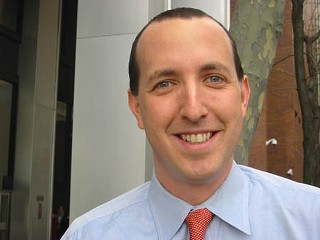Ben Wizner on Taking On the CIA
The ACLU lawyer was in town recently at a screening of Secrecy
By Richard Whittaker, Fri., Nov. 7, 2008
The Bush White House will be leaving a mess of unfinished business for the next administration and the U.S. legal system. But the worst task Bush leaves behind may be figuring out what to do with detainees seized in the war on terror still being waged in CIA-run "black sites." "There's a public debate about the efficacy and legality and morality of torture," said ACLU lawyer Ben Wizner when he was in Austin last week. "But what's going on in the courts is no real debate at all."
Wizner attended an Oct. 29 screening of Secrecy, a documentary about the ever-growing culture of state secrets. He joined the ACLU in August 2001, expecting to work with prisoners in Los Angeles; instead, he started representing alleged terrorist detainees in CIA-run sites around the world. ("So there's a certain continuity between my plans and what actually worked out," he noted.) That's how he became lead attorney in El-Masri v. George Tenet, the groundbreaking suit, featured in the film, against the former CIA director.
In a shocking example of mistaken identity, Khaled El-Masri, a Lebanese-born German citizen with no terrorist connections, was seized by the CIA in Macedonia in 2003, shipped to a "black site" in Afghanistan called the Salt Pit, tortured, and, after five months, dumped on an empty road in Albania. When he tried to sue the U.S. government, the CIA claimed his entire experience was a matter of national security and therefore could not be publicly discussed – an argument the U.S. Supreme Court accepted and applied to block other detainee suits. "No court has looked at the legal claims and said this conduct is legal," said Wizner. "They get dismissed because the CIA invokes secrecy."
While Wizner was in Austin, the Washington, D.C., circuit court rejected an ACLU Freedom of Information Act request for unredacted transcripts of statements made by ACLU clients. "This conflict is posited as civil liberties and freedoms on one side and national security on the other, and in a lot of these instances, the programs have made us less safe," he said. "Invoking something like the state secrets to avoid giving a remedy to an innocent victim is really a calamity for counterterrorism."
Despite defeats, Wizner hasn't lost hope for accountability in the U.S.: "Worldwide, when torturers are brought to justice, it's normally not two years later; it's 20 years later. So I just keep saying to people on our side, 'Be patient.'"
Got something to say on the subject? Send a letter to the editor.









